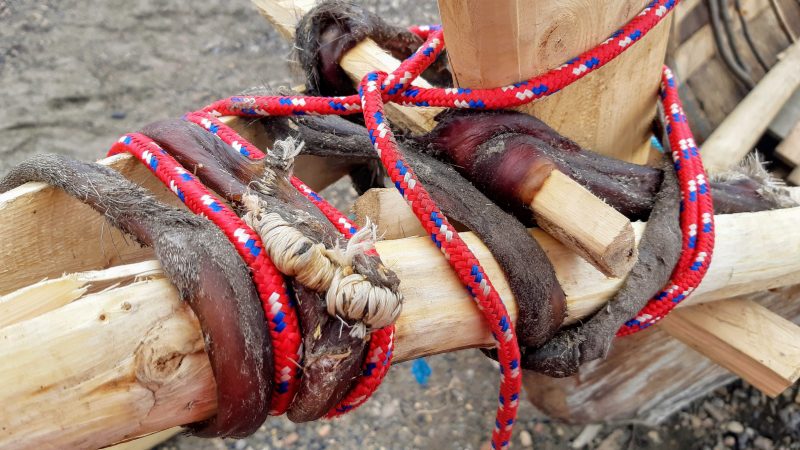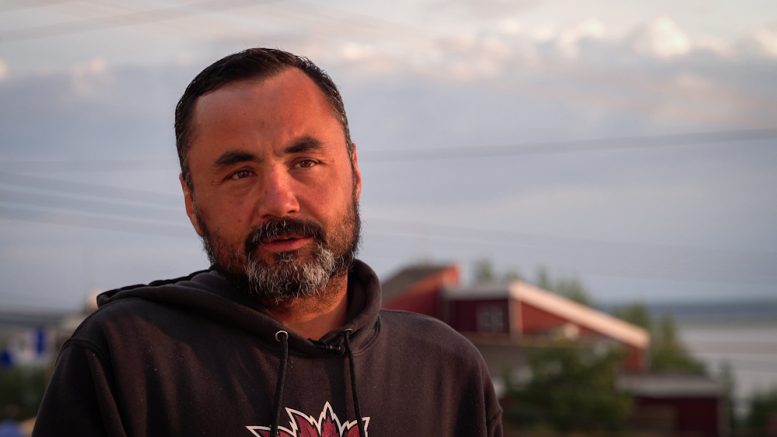James McPherson says he jumped at the chance to learn how to build a moose skin boat.
Nearly 30 people — including Elders, hunters and cooks — set up camp along the shores of the Keele River in early July to take on the multi-week project.
McPherson joined at the last minute as an emergency coordinator but says he also contributed in other ways.
For one thing, he contributed one of the seven hides it took to build the boat.
“I was blessed with shooting a moose, providing meat for the camp and to have my hide on the moose skin boat was a pretty special feeling,” he says.
Once built, the goal was to paddle the boat down the Keele and arrive in Tulita for the community’s commemoration of 100th anniversary of Treaty 11. But on the way, one of the pieces of wood in the bottom of the boat broke. The paddlers stopped at Big Smith creek to replace it and put in seven new ribs. Towing the boat in the wind had caused them to move and put extra stress on the piece in the bottom. After the repairs, the weather looked like it would be too windy to arrive later on the commemoration day, so the small group of paddlers remaining pushed on through the night and landed on the community’s shores about 4 a.m.
McPherson says he’s been “fascinated” with the process since being a kid and seeing the film on the 1981 construction and journey of a moose skin boat along the Deh Cho. That boat is still on display at the Prince of Wales Northern Heritage Centre.
Again in 2018, Shúhtaot’ı̨nę Elders worked with a group Dehcho Dene to build a mooseskin boat and paddle along the Nahanni River. That journey also became a film Nahanni: River of Forgiveness.
‘Starting to find my way’
The moose skin boat project was the latest in McPherson’s journey to reconnect to the land, his culture, himself, and his sobriety.
Five years ago, he decided to become sober and since then “it’s all about finding myself again.”
After quitting, he struggled with losing the social network that comes with drinking. He leaned on his Elders, who encouraged him to stick with it and find his way.
“I feel now I’m starting to find my way, especially with being a part of the mooseskin boat project,” he says. “Being able to shoot a moose and get some stitching in there that would make my mother proud after teaching me how to sew. Same with the rifle that I was given from my brother.”

In addition to hides, moose sinew and other parts are also used in the construction of the boat. (Francis Tessier-Burns/CKLB)
Reconnecting to the land has been a crucial part to McPherson’s journey over the last five years. Four years ago, he started Sahtú Adventures Inc. as a way to reconnect with his culture and “make a living at the same time.”
Originally from Tulít’a, and now living in Tłegǫ́hłı̨ (Norman Wells), he says communities are accustomed to working in oil and gas. For him, it was a conscious decision to try and merge traditional teachings and work.
CKLB asked whether it feels different being on the land for business vs pleasure like with the moose skin boat.
“Everything is connected in some way so there’s no telling the difference between one or the other,” says McPherson.
As the project was part of Tulít’a’s Treaty 11 commemorations, McPherson reflected on the future.
Personally, he’s taking steps to re-learn his traditional language; broadly, he hopes to see “more of our history put into the history books” and in schools.
He said he feels a new chapter beginning with more and more people receiving an education and being grounded in culture.
Correction: A previous version of this story said one of the hides ripped in the boat. It also said McPherson was a camp coordinator, rather than emergency coordinator, and that he started Sahtú Adventures two years ago. CKLB regrets the errors.





